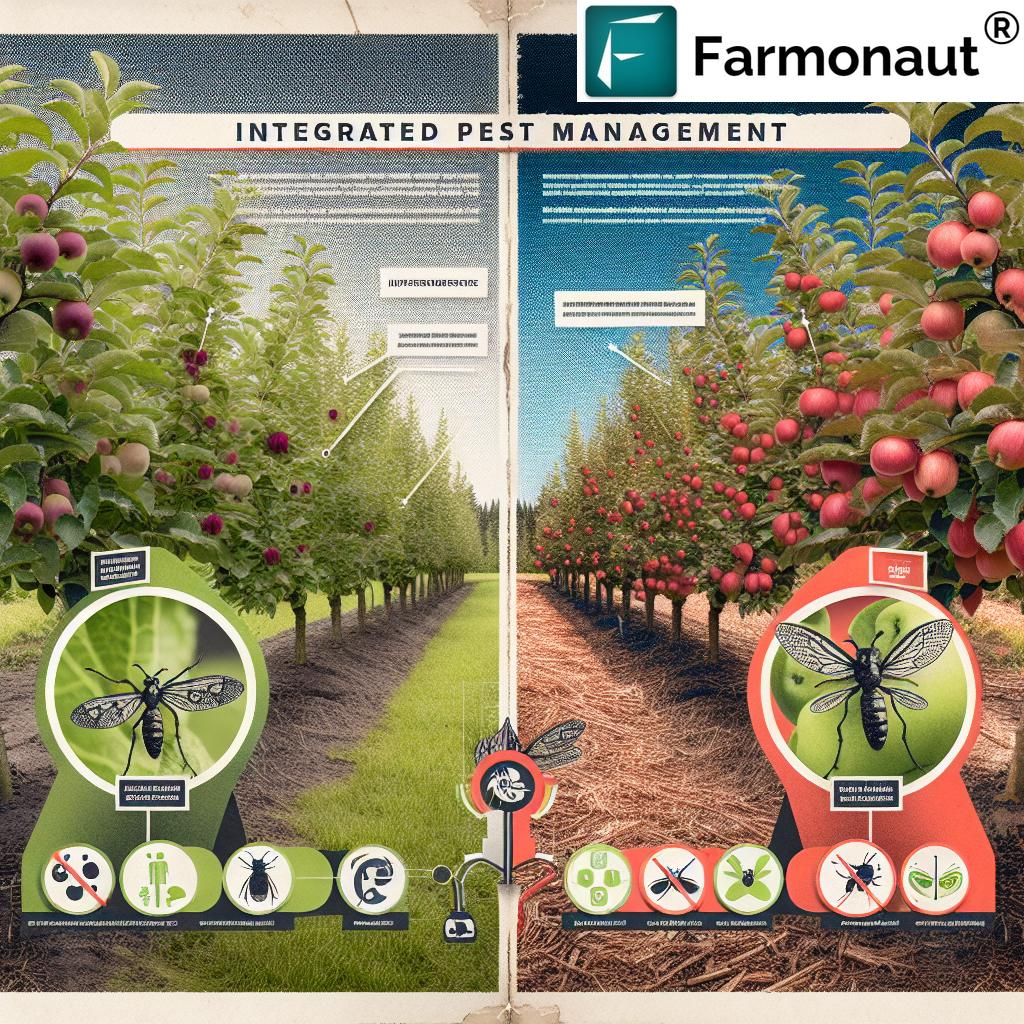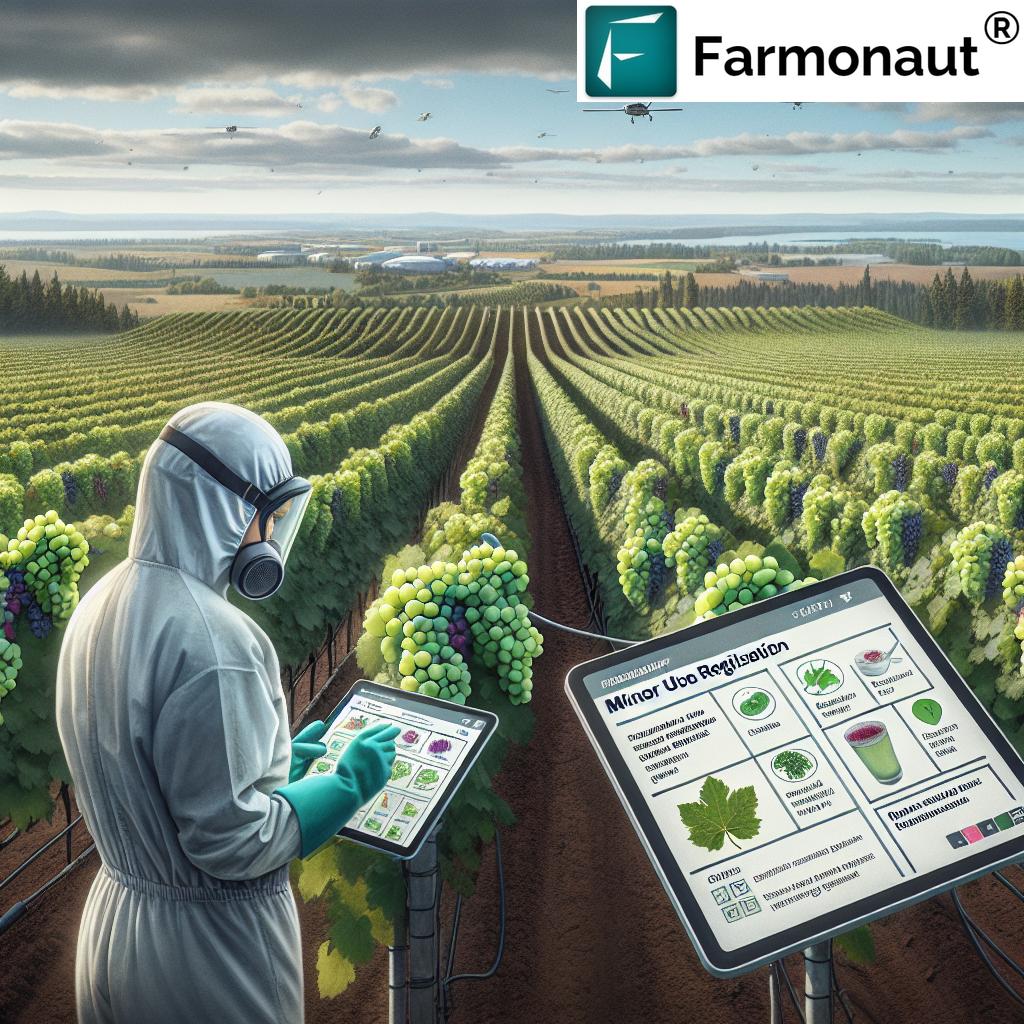Canada Approves Innovative Insecticidal Soap for Spotted Lanternfly Control in Fruit Crops
“Canada’s PMRA approved Kopa insecticidal soap for spotted lanternfly control on 5+ fruit crops, including apples and grapes.”
In a significant development for Canadian agriculture and crop protection, the Pest Management Regulatory Agency (PMRA) has recently approved a minor use registration for Kopa insecticidal soap to suppress spotted lanternfly nymphs on fruit trees and grapes. This proactive measure demonstrates Canada’s forward-thinking approach to agricultural pest management, even though the pest hasn’t been detected in the country yet.
At Farmonaut, we understand the importance of staying ahead of potential threats to our agricultural sector. As a leading provider of satellite-based farm management solutions, we’re excited to explore the implications of this regulatory decision for integrated pest management (IPM) strategies in Canadian horticulture.

Understanding the Spotted Lanternfly Threat
The spotted lanternfly (Lycorma delicatula) is an invasive insect species that has caused significant damage to various crops, particularly in the eastern United States. Although not yet present in Canada, the potential threat it poses to our agricultural industry is substantial. This pest primarily affects:
- Fruit trees (apples, pears, stone fruits)
- Grapes
- Hops
- Hardwood trees
The nymphal stages of the spotted lanternfly are particularly destructive, feeding on plant sap and excreting honeydew, which promotes the growth of sooty mold on leaves and fruits. This can lead to reduced photosynthesis, weakened plants, and ultimately, crop losses.
Kopa Insecticidal Soap: A New Tool for Growers
The approval of Kopa insecticidal soap for spotted lanternfly management provides Canadian growers with a valuable new tool in their pest control arsenal. This insecticidal soap for fruit trees offers several advantages:
- Targeted suppression of spotted lanternfly nymphs
- Low environmental impact
- Compatibility with organic farming practices
- Minimal risk of pest resistance development
The registration covers a wide range of fruits, including:
- Apples
- Pears
- Grapes
- Various berry crops
This broad coverage addresses the concerns of growers and extension personnel across multiple horticultural sectors.
Integration with Integrated Pest Management (IPM) Strategies
The introduction of Kopa insecticidal soap aligns perfectly with the principles of integrated pest management IPM. IPM strategies focus on long-term prevention of pests through a combination of techniques, including:
- Biological control
- Habitat manipulation
- Cultural practices
- Use of resistant varieties
By incorporating Kopa into existing IPM programs, growers can enhance their crop protection efforts while minimizing the use of harsher chemical pesticides. This approach not only benefits the environment but also helps maintain the delicate balance of beneficial insects in agricultural ecosystems.
“Kopa’s registration targets spotted lanternfly nymphs, a pest not yet detected in Canada, showcasing proactive agricultural management.”
The Registration Process for Minor Use Pesticides
The approval of Kopa for spotted lanternfly control highlights the importance of the minor use pesticide registration process in Canada. This process allows for the registration of pest control products for use on crops where the potential market is not large enough to justify the costs of registration by the manufacturer.
Key aspects of the minor use registration process include:
- Collaboration between growers, researchers, and regulatory agencies
- Rigorous safety and efficacy evaluations
- Consideration of potential environmental impacts
- Assessment of residue levels in treated crops
The successful registration of Kopa demonstrates the commitment of Canadian regulatory agencies to providing growers with effective and sustainable pest management solutions.

Comparison of Insecticidal Soap vs. Traditional Insecticides
To better understand the advantages of Kopa insecticidal soap, let’s compare it to traditional insecticides used for spotted lanternfly control:
| Product Name | Active Ingredient | Target Pest Stage | Approved Crops | Estimated Efficacy (%) | Environmental Impact | Cost-effectiveness | Integration with IPM Strategies |
|---|---|---|---|---|---|---|---|
| Kopa Insecticidal Soap | Potassium salts of fatty acids | Nymphs | Fruit trees, grapes, berries | 70-80 | Low | High | Easy |
| Traditional Pyrethroid | Bifenthrin | Nymphs and Adults | Various fruit and ornamental crops | 80-90 | Medium | Medium | Moderate |
| Neonicotinoid | Imidacloprid | Nymphs and Adults | Various fruit and vegetable crops | 85-95 | High | Medium | Difficult |
As we can see, while traditional insecticides may offer slightly higher efficacy, Kopa insecticidal soap provides a more environmentally friendly option with easier integration into IPM strategies.
Impact on Canadian Fruit and Vegetable Production
The approval of Kopa insecticidal soap for spotted lanternfly control has significant implications for Canadian fruit and vegetable production. By providing growers with a proactive tool to manage this potential pest, the agricultural sector is better prepared to protect valuable crops such as:
- Apples and pears in Ontario and British Columbia
- Vineyards in the Niagara region and Okanagan Valley
- Berry farms across the country
This preparedness is crucial for maintaining Canada’s position as a leading producer and exporter of high-quality fruits and vegetables.
The Role of Technology in Modern Pest Management
At Farmonaut, we understand the critical role that technology plays in modern pest management and crop protection. Our satellite-based farm management solutions complement innovative crop protection technologies like Kopa insecticidal soap by providing:
- Real-time crop health monitoring
- Early detection of pest infestations
- Precision application of pest control measures
- Data-driven decision-making for growers
By combining these technological advancements with sustainable pest control products, we can create more resilient and productive agricultural systems.
Explore our advanced agricultural solutions:
Sustainable Agriculture Practices and Pest Suppression
The approval of Kopa insecticidal soap aligns with the growing emphasis on sustainable agriculture practices in Canada. By providing an environmentally friendly option for pest suppression, this product supports efforts to reduce the overall chemical footprint of agricultural operations.
Key benefits of adopting sustainable pest management practices include:
- Improved soil health
- Enhanced biodiversity in agricultural landscapes
- Reduced risk of pesticide resistance development
- Increased consumer confidence in food safety
As we continue to face challenges such as climate change and invasive species, the integration of sustainable pest control methods becomes increasingly crucial for the long-term viability of our food production systems.
Regional Considerations for Spotted Lanternfly Management
While the spotted lanternfly has not yet been detected in Canada, its presence in neighboring regions, particularly in the northeastern United States, highlights the need for regional cooperation in pest management strategies. Key considerations include:
- Monitoring efforts in border regions, especially in southern Ontario and Québec
- Collaboration with U.S. counterparts, particularly in states like New York and Pennsylvania
- Development of early detection and rapid response protocols
- Public education and awareness campaigns to help identify and report potential sightings
The approval of Kopa insecticidal soap provides an important tool for these regional management efforts, allowing for a coordinated and proactive approach to potential spotted lanternfly infestations.
The Future of Crop Protection in Canadian Horticulture
The registration of Kopa insecticidal soap for spotted lanternfly control is just one example of the evolving landscape of crop protection in Canadian horticulture. As we look to the future, several trends are likely to shape the industry:
- Increased adoption of biopesticides and other low-impact pest control products
- Greater integration of precision agriculture technologies in pest management
- Development of pest-resistant crop varieties through advanced breeding techniques
- Enhanced focus on ecosystem-based approaches to pest control
At Farmonaut, we’re committed to supporting these advancements through our innovative satellite-based farm management solutions. By providing growers with real-time data and insights, we empower them to make informed decisions about pest management and overall crop health.
Discover how our API can enhance your agricultural technology solutions:
Conclusion: A Step Forward in Proactive Pest Management
The approval of Kopa insecticidal soap for spotted lanternfly control in Canada represents a significant step forward in proactive pest management for our fruit and vegetable crops. This decision by the Pest Management Regulatory Agency demonstrates a commitment to providing growers with effective, environmentally friendly tools to protect their harvests.
As we continue to face the challenges of invasive species and changing climate patterns, the integration of innovative pest control products with advanced agricultural technologies will be crucial. At Farmonaut, we’re proud to be at the forefront of this agricultural revolution, providing growers with the data and insights they need to make informed decisions about crop protection and overall farm management.
By embracing these advancements and maintaining a proactive stance on pest management, Canadian agriculture can continue to thrive, ensuring a stable and sustainable food supply for generations to come.
FAQ Section
- Q: What is Kopa insecticidal soap?
A: Kopa is an insecticidal soap approved for use in Canada to suppress spotted lanternfly nymphs on fruit trees and grapes. - Q: Has the spotted lanternfly been detected in Canada?
A: No, the spotted lanternfly has not yet been detected in Canada. The approval of Kopa is a proactive measure. - Q: Which crops are covered by the Kopa registration?
A: The registration covers various fruits, including apples, pears, grapes, and berries. - Q: How does Kopa insecticidal soap fit into IPM strategies?
A: Kopa provides a low-impact option for pest control that can be easily integrated into existing Integrated Pest Management programs. - Q: What are the environmental benefits of using insecticidal soaps?
A: Insecticidal soaps like Kopa have a lower environmental impact compared to traditional pesticides and are compatible with organic farming practices.






